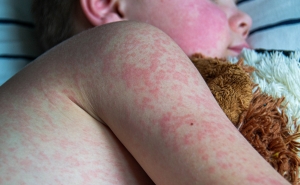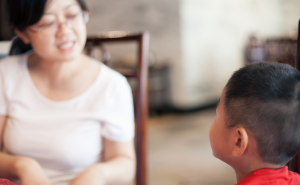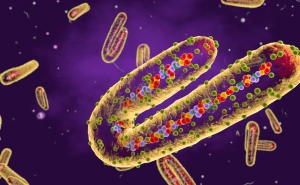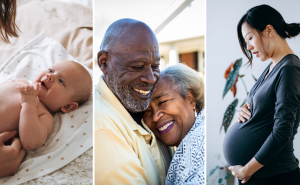How Can I Talk to My Friends and Family About Getting Vaccinated for COVID-19?
It’s fair for people to have questions about COVID-19 vaccines. Fortunately, there are answers.

BY RUPALI LIMAYE, TARA KIRK SELL, AND ELIZABETH STUART
Over the past few months, millions of Americans have gotten vaccinated for COVID-19, bringing hopes that the coming months could look a lot more “normal” than the last 14.
But, as vaccines have become more widely available, it’s becoming clear that the new challenge isn’t just access—it will be addressing widespread questions and helping those who might still be on the fence decide to get the jab—especially those age 65 and older, who are at most risk of severe COVID-19.
It’s fair for people to have questions about the vaccine. Those who are vaccinated can help by becoming public health “ambassadors” and helping friends and family feel more confident about COVID-19 vaccines. So, what can you say to a loved one who expresses hesitation about getting vaccinated? What are the best resources to answer questions? How can you convince people that while getting vaccinated is a highly personal choice, it’s also necessary on a larger scale to help defeat the pandemic?
The first step is to connect on shared values and beliefs. We may all have different views of the pandemic and its implications, but we share many important ideals. Don’t make it a battle or competition. If you need more information or facts, the CDC, NIH, and the Johns Hopkins Coronavirus Resource Center websites are good places to start.
This article addresses some specific hesitations. Rupali Limaye, an expert in vaccine hesitancy, Tara Kirk Sell, an expert in health security, and Elizabeth Stuart, an expert in mental health, provide some practical and interpersonal responses.
Let us know what hesitations you’re hearing: publichealthquestion@jhu.edu
HESITATION: I plan to wait and see if the vaccine is safe and may get it later.
Everyone wants to be sure that they are as safe and healthy as possible. As of May 2021, more than 100 million Americans have been fully vaccinated. Public health agencies have been watching closely for any safety signals. We have safety data going back as far as August 2020, when Pfizer and Moderna first began vaccinating Phase 3 clinical trial participants. Based on the many vaccines administered already, we can feel confident that the vaccine has a really good safety record.
The reality is that not getting vaccinated puts you at much higher risk of severe COVID-19, which can make you seriously sick for a long period of time and possibly cause lasting damage. Getting vaccinated sooner can protect you from these risks.
SOURCE: NPR Vaccination Tracker
Interpersonal Insights
People often relate strongly to the experiences of those around them, so share that you have been vaccinated with friends and family; seeing others whom they trust and respect having made the decision to get vaccinated might help them feel more comfortable. And perhaps share your own decision-making process and why you decided to go ahead and get the shot(s)!
HESITATION: I am concerned about possible side effects of a COVID-19 vaccine.
It’s understandable to worry about not feeling well. It’s important to know that side effects from vaccines are short-lived and not harmful—unlike COVID-19, which can cause serious illness and lasting damage.
Some people feel a bit out of sorts for a day or two after getting vaccinated. The most common side effect is soreness at the site of injection. Other effects might include fatigue, headache, muscle aches, chills, joint pain, and possibly some fever. These side effects may start within a few hours of receiving the vaccine but usually last just 24 to 48 hours and no more than a few days.
Side effects are more frequent after the second dose, so, if possible, plan to get the second dose the day before a day off from work, or try to postpone things for a few days.
SOURCE: Johns Hopkins Bloomberg School of Public Health
Interpersonal Insights
Again, share your experiences with friends and family. And be honest—if you had short-term side effects, mention those so that others aren’t caught off guard if they experience fever or tiredness themselves. Plus, knowing what to expect can help them plan accordingly and arrange for an easier day or two after their vaccination if possible. But you can also reassure them and reinforce the fundamental message that a day or so of anticipated side effects is much easier to deal with than COVID-19 itself.
HESITATION: I don’t believe I need a COVID-19 vaccine.
Even if you are young and healthy and practice COVID-19 precautions like wearing masks and social distancing, it’s important to get vaccinated.
As more and more people are vaccinated, the virus will have fewer people to infect, and community transmission will go down. This means we can start to get back to “normal” quicker. Every person that gets vaccinated brings us one step closer to ending the pandemic.
It’s also important to note that even if you have already had COVID-19, you still need to get vaccinated. That’s because the immunity you can get after having COVID-19 may not be as strong or long-lasting as the protection you can get from a vaccine.
Some people may also be persuaded by the added convenience of being vaccinated. You don’t have to quarantine if you’ve been exposed to someone who you later found out was infected with COVID-19. And, if you might end up traveling someplace that requires a vaccine, that will already be taken care of. Plus, at the end of the day, you will be protected against the disease, so you won’t have to worry about getting other people sick or causing them to need to quarantine by accident.
SOURCE: Public Health On Call
Interpersonal Insights
Throughout the pandemic it has been important to consider how our actions impact ourselves, our families, and our communities. Vaccination is no different.
You can remind loved ones that they play a role in helping the world get to herd immunity. Getting vaccinated is a personal choice that will help all of us—including infants, children, and people who cannot be vaccinated for health reasons—and also help reduce the opportunity for variants to emerge.
HESITATION: If people are still catching COVID-19 after being fully vaccinated and I still have to wear a mask, what’s the point?
Everyone wants to get back to normal as soon as possible. COVID-19 vaccines do a great job of preventing serious illness. Although rare breakthrough cases do occur because there is still a lot of illness in the community, these are not frequent and usually not severe. Getting vaccinated can help reduce levels of illness in the community, protect people from becoming seriously ill, and lower the likelihood that a new variant of the virus will emerge.
SOURCES: The New England Journal of Medicine, Johns Hopkins Bloomberg School of Public Health
Interpersonal Insights
We are at a tricky point in the pandemic, with restrictions loosening somewhat for vaccinated people (e.g., new guidance from the CDC around outdoor mask wearing). So, we are seeing some situations in which vaccinated people can start to get back to normal, whether that’s not wearing a mask when outdoors or going to eat indoors at a restaurant.
However, vaccine uptake is still not widespread enough and rates of disease are still high enough in many areas that we can’t fully relax the guidelines and restrictions. That’s where we need a team approach to get enough people vaccinated to really start seeing decreases in community transmission.
HESITATION: I am concerned about having an allergic reaction to a COVID-19 vaccine.
A lot more is known now about the extremely rare allergic reactions that occurred early on in the vaccination rollout. Safety monitoring has shown that people who have had a severe allergic reaction to polyethylene glycol, one ingredient in the vaccine, should be concerned about an allergic reaction. People with a history of this particular allergy should consult their doctor before getting a COVID-19 vaccine.
People with severe allergies to foods, certain oral medications, latex, bee stings, or venom can safely receive COVID-19 vaccines.
SOURCE: Massachusetts General Hospital
Interpersonal Insights
These rare situations where someone should not get the vaccine, on the advice of their medical provider, should motivate the rest of us to get vaccinated! Infectious diseases such as COVID-19 remind us that we are all connected, and the more each of us can do to help limit the spread of disease, the safer we will all be.
HESITATION: I don’t trust COVID-19 vaccines.
We all agree that we need to trust that vaccines are safe. All of the required regulatory steps—including safety and efficacy—were taken to produce these vaccines; they just happened in a condensed period of time because we were in a pandemic.
The technology used to build mRNA vaccines (like Pfizer’s and Moderna’s) has been around for more than a decade. Researchers have been working with this technology to produce vaccines for a number of other viruses like influenza and rabies, but those hadn’t gone through Phase 3 clinical trials yet, simply because there wasn’t the urgent need or the funding to continue development. With COVID-19, researchers were able to leverage technology that had been in the works for years.
SOURCES: Public Health On Call, Johns Hopkins Bloomberg School of Public Health
Interpersonal Insights
Personal experiences and perspectives can be so important. Tell your friends and neighbors (and acquaintances!) how you made the decision to get the vaccine—what data did you look at, which sites did you trust and learn from? Conveying your own investigations, questions, and learning can help those you are talking with understand the data and science too, and hear it from a trusted source (you!).
Finally, many prominent figures like former presidents, pro athletes and celebrities, and religious leaders are openly talking about their confidence in COVID-19 vaccines, sharing their own vaccination process, and encouraging others to get the jab.
HESITATION: I don’t have health insurance. What if I can’t afford a COVID-19 vaccine?
COVID-19 vaccines are free of charge and no insurance is required.
You cannot be billed for vaccination. If you do receive a bill, you should first speak to the person or facility that sent a bill. If they don’t cancel it, contact the HHS Office of Inspector General Hotline at 1-800-HHS-TIPS or visit TIPS.HHS.GOV to file a complaint.
SOURCE: Vivek Murthy, Surgeon General
Interpersonal Insights
Ask your friends and neighbors what their own personal barriers are to vaccination: Is it access? Safety concerns? Transportation? Concerns about the cost? Asking explicitly can help you connect them with resources—or even a ride—to help them overcome those barriers.
Let us know what hesitations you’re hearing: publichealthquestion@jhu.edu
Rupali Limaye, PhD, MPH, is an associate scientist in the Department of International Health with joint appointments in Health, Behavior and Society and Epidemiology.
Tara Kirk Sell, PhD, is a senior scholar at the Center for Health Security and an assistant professor in Environmental Health and Engineering.
Elizabeth Stuart, PhD, AM, is the associate dean for Education at the Bloomberg School and a professor in Mental Health, Biostatistics, and Health Policy and Management. She was recently appointed as a Bloomberg Professor of American Health.





